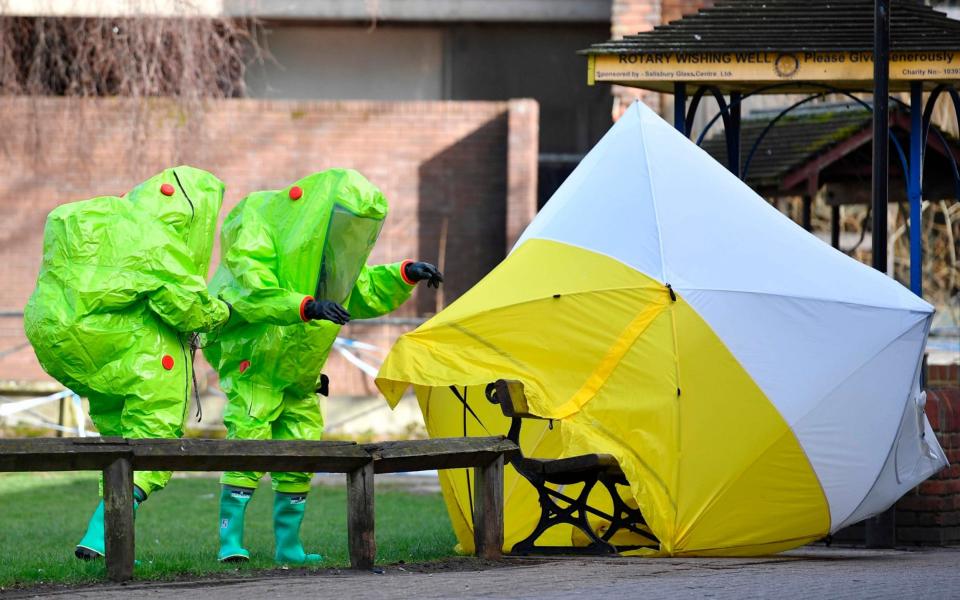Salisbury poisoning was 'big neon advertisement' about the power of chemical attacks, warns al-Qaeda insider

The Salisbury poisoning acted as a "big neon advertisement” to jihadists for the power of chemical attacks, an al-Qaeda insider-turned-British spy has said, as terrorists again appear to be pursuing the tactic.
Aimen Dean said the use of chemicals and poisons in alleged plots in recent months showed chemical terrorism was a growing risk.
The former jihadist who took part in experiments to develop chemical devices in the late 1990s told the Telegraph that the collapse of Islamic State group's territory could spur on militants to again use the weapons.
Widespread news coverage of the poisoning of Sergei Skripal and his daughter with a military grade nerve agent, coupled with the disruption and cost of the clean-up had shown the propaganda potential of chemicals, he suggested.
In the West a 29-year-old was able to produce ricin inside Germany, then we should worry
Aimen Dean
Mr Dean says he spent years as a jihadist in the 1990s, starting on the battlefields of Bosnia to defend Muslims against Serb aggression and ending up training in Afghanistan with al-Qaeda. His revulsion at al-Qaeda's targeting of civilians led him to decide to instead offer his services to British intelligence and become a spy on the inside of the movement for MI6 and MI5.
He has told of his journey from childhood in Saudi Arabia and Bahrain to becoming the West's top spy inside Al Qaeda in his memoirs, Nine Lives, published earlier this month. The British government has not commented on his account, but it has been endorsed by a string of counter terrorism experts.
Mr Dean said the development of chemical weapons and poisons had been a priority for al-Qaeda in its early years, but jihadists had in later years instead fallen back on conventional explosives.
He said recent alleged Islamist extremist plots in Sydney and Cologne that were due to use chemicals or toxins showed “the intent is back again”.
Last week German police said they had arrested a 29-year-old who had allegedly manufactured the toxin ricin in Cologne. Ricin, made from castor beans, is one of deadliest biological agents known to man.

Two men are awaiting trial in Australia after they are alleged to have plotted an attack with a homemade "chemical dispersion device" to release hydrogen sulfide gas on public transport. The gas known for its rotten egg smell is also highly toxic.
Mr Dean said two such plots in quick succession should alarm authorites.
He said: “In the West a 29-year-old was able to produce ricin inside Germany, then we should worry. It's the first time this has has ever happened and this will set a trend again. It was attempted in Sydney to use a gas device it shows that the intent is back again and that the frequency is somewhat alarming.”
The Salisbury attack, which Britain blames on Russia, demonstrated the impact of chemical attacks even if they fail, he said.
“Two people got sick and the estimated cost of decontamination for Salisbury basically was running into tens of millions of pounds, because of all the economic disruption, plus the decontamination. That would have given them an idea.”
It is also the overwhelming psychological terror of chemical weapons which 'excites' the terror network. It's easy and cheap to execute, huge bang for your 'buck'
Hamish de Bretton Gordon
He went on: “The Salisbury attack was just something that was a big neon advertisement for jihadists that they could do that. You already have the know how, you could cause maximum panic and disruption and this could be in the news for weeks. It's a win, win win situation for them.”
Hamish de Bretton Gordon, a former commander of the British military's chemical, biological, radiological and nuclear regiment, agreed that jihadists would have noticed the impact of the Salisbury attack.
He said: “But it is also the overwhelming psychological terror of chemical weapons which 'excites' the terror network. It's easy and cheap to execute, huge bang for your 'buck'.”
During his time in Afghanistan, Mr Dean was taught by Abu Khabab al-Masri, an Egyptian master bomb maker who gave his services to various Islamist groups and experimented with both homemade explosive and chemical weapons.
His team dabbled with toxins including nicotine and botulin, and gases including hydrogen cyanide, cholorine and phosgene, testing their handiwork on rabbits and dogs.

Mr Dean eventually had to flee his work as a spy in 2006 when his cover was blown by a US government leak to the media.
He said that while jihadists had intended to launch attacks in the early 2000s using techniques developed in Afghanistan by al-Masri, explosives then became the weapon of choice.
Islamic State group had used chemicals on the battlefield in Syria and Iraq from 2015, but it was only recently that they had re-emerged as a threat in the West, he said.
He suggested jihadists had been cautious about the use of such weapons in the West because they would provoke massive retaliation.
The collapse of their self-proclaimed caliphate may now have persuaded them to abandon such caution.
He said: “Now they have no territories, so you can say the gloves are off. Because now they could easily say we have no territories and we can easily basically use a poison weapon to start with and then move on.”
Protect yourself and your family by learning more about Global Health Security

 Yahoo News
Yahoo News 